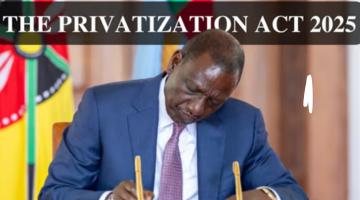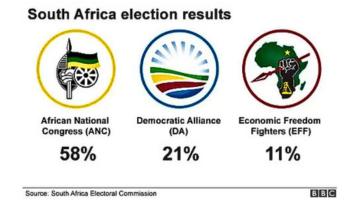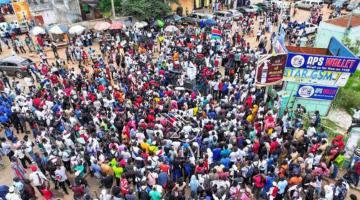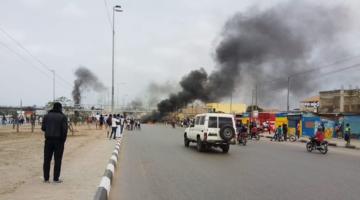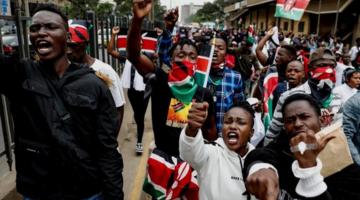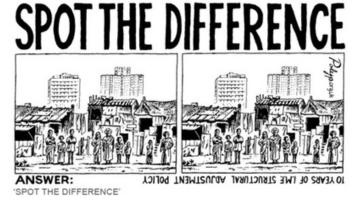Reflecting on the mass protests that recently shook Kenyan society from top to bottom, Joel Mukisa argues that we must go much further than a choiceless democracy to find answers. A systematic questioning of the underlining political and economic structures underpinning the choices on offer must be undertaken.
Originally published in ROAPE.
If you asked a think-tank team leader, a social sciences Professor at Nairobi University if they anticipated the scale and popularity of the protests that rocked East Africa’s economic powerhouse Kenya, only a few months ago many honest people would simply retort, NO!
The protests that rather appeared spontaneous characterized mainly by a young generation of Kenyans known as Gen Z protesting the Finance Bill (an annually produced document that lays out the government’s fiscal strategy) that would introduce a cocktail of new taxes on essential and basic commodities. This comes on the heels of an economy recuperating from the COVID-19, Ukraine War, the decpreciation of the Kenyan shilling, massive unemployement, massive debt and a divisive election.
The protests were characterized by incidents of violence among the deaths, shootings by Kenya’s Police, deployment of the Armed Forces, looting, plunder and the most dramatic, setting the national parliament ablaze. This all came as a surprise especially to Africanists that have viewed or tounted Kenya as a radical break with what it stereotypically labelled African.
Kenya is characterized as democratically stable and having strong democratic institutions. So the force meted out by Kenya’s police or even such rabid dissent with a leader of William Ruto’s stature and credentials can seem to be confusing. These tribeless protests can not be understood under the banal templates of “ethnic madness.” This is why I argue we must understand this protest movement as merely examples of something broader than even the protestors were saying which is characteristic of contemporary social movements.
Nomeclature
It may sound bourgeoisbut before we begin to understand the systemic shifts and questions the protest generated, we should understand it by the name under which it moves. The protests begun under the #OccupyParliament. Which was symbolic of the need to take a sovereign democratic institution and its symbolic power into the hands of the majority. This was after and slightly before parliament debated and passed the Finance Bill.
Despite objections raised and wide mass distemper against the law, parliamentarians of the Kenya Kwanza (the main party of governement) hurriedly passed the law with amendments from the minority. Government claimed that it had listened and hence the amendments. The tone shifted with Gen Z clarifying that they wanted: “Reject Not Amend.” The Amendment signalled the state’s ability to offer more if push came to shove and many urged those protesting to up the ante, and their gamble paid when Kenya’s President William Ruto declined to ratify the impugned Bill sending it back to Parliament.
It is in this context of democracy’s failure that #OcuppyParliament must be understood.
#OccupyParliament is not a fresh lexicon in the Antropocene. It first emerged in 2011 with the #OccupyWallStreet as a left-wing anarchist movement against economic inequality, corporate greed and the influence of money in politics that had begun in Zuccotti Park, in New York City’s financial district, and lasted from September 17 to November 15, 2011.
How can we better situate #OcuppyParliament without reducing it to an analogous analysis but rather steeping it within both its national, regional and international histriocity.
We can glean from the foregoing that from the onset #OcuppyMovements are mobilized online, overcoming differences emanating from historical injuries such as race, tribe (in the African context) and class, gender (not so much) as bodies assemble on the streets to make the point that life is nolonger liveable.
These protests made known a hard truth that unity does not precede political praxis; it is produced through political struggle. They bypass established democratic institutions that they think are part of the mess. They are leaderless hence less prone to compromise and represent a shift in ways of political organization.
This spectre started in 1978 with the Soweto uprising that changed the conventional understanding of struggle from armed to popular struggle. Ordinary people stopped thinking of struggle as something waged by professional fighters, armed guerrillas, with the people cheering from the stands, it continued to Tahrir square in Cairo in 2011 when Hosni Mubarak was forced to resign. Little wonder the protesters hope that for their mission to be complete, Ruto too, must resign and that’s why after him ceding to their demands and refusing to sign the law, they continued to protest insisting that he too resign under the hashtag #RutoMustGo.
The Metaphor
CNN journalist Larry Madowo interviewed two people who have been subject of humor and caricature. He asked them why they were on the streets. What particular grievances they had against the state that perhaps prompted them to come to the streets? The answers shifted from incoherent and incomphrensible to muffled and inarticulate hinting at a systemic problem from which the Finance Bill is the starting blocks through which mass hysteria could be immediately articulated.
Kenya is part of what has been termed as the African crisis or African Tragedy. The foregoing are adjectives for endemic poverty, high unemployement rates, inflation, corruption, deterioting terms of trade, cronynism and debt dependence. These were in recent times compounded by the Corona Virus pandemic, a war in Ukraine, among an array of other international factors. In such a fix with a near financial crunch just pending, the Kenyan leadership was forced onto the IMF who imposed the usual straitjacket.
The IMF insists that the crises are budgetary, i.e, that government expendintures have excedded revenues and the demand for foreign exchange outstripped supply. The short term antidote is to freeze wages, cut social programs and subsidies. Secondly, increase production from the supply side by transfering resources from the classes which have a tendency to consume to those that have a tendecy to invest. The recommendations at times include regressive tax regimes on the middle class. A middle class that been vanishing since 2008 during the Kibaki administration. It’s the same middle class on whom the new taxes would be imposed – joined by their dependant subaltern kith and kin on the streets in protests that were reminiscent of the 20th century bread riots that too, opposed IMF and World Bank Austerity.
Kenya’s path on this neo-liberal financing model must be one of the most ambitious on the continent and has been sustained across decades without proper scrutiny of its nefarious, cataclysmic implications such as the wide and dispropriate levels of inome inequality that has been an enabler in the reproduction of a political caste or aristocracy from which “alternatives” in the multi-party dispensations are to be chosen. The political economist Thandika Mkandwire refered to this as choiceless democracy given that it restricted sets of policy options available to African states, which find themselves strangled by a skewed international economic structure, the neoliberal economic and security demands of donors, and the pervasive presence of foreign NGOs and development agencies.
Therefore the inarticulate protesters referred to above speak against this context of an all powerful elite and under an ever contracted political landscape that benefits a few. The concrete example should be how the opposition had fielded amendments to this regressive bill in parliament that it later withdrew under the auspieces of a protest gaining momentum.
If the current state of democracy is limited in its scope to tackle the pervasive issues that bedevil us today and institutions of the global economy such as IMF and World Bank remain unfazed as we stand in the hot African sun to elect leaders, then democracy as it has been sold to us has failed.
So do we do as part of the #OcuppyParliament movement? Do we continue reforming the political system to which this mess is greatly attributable. As Zizek reminds us here, Marx’s key insight remains as pertinent today as it ever was: the question of freedom should not be located primarily in the political sphere – i.e. in such things as free elections, an independent judiciary, a free press, respect for human rights. Real freedom resides in the ‘apolitical’ network of social relations, from the market to the family, where the change needed in order to make improvements is not political reform, but a change in the social relations of production. We do not vote concerning who owns what, or about the relations between workers in a factory and their bosses. Such things are left to processes outside the sphere of the political, and it is an illusion that one can change them by ‘extending’ democracy – say, by setting up ‘democratic’ banks under people’s control.
The democractic illusion may thus be the real impediment to real time transformation of the social relations of production and the start of a conversation on the politics of redistribution that has been supplanted by the discourse of recognition that has atomized emanicipatory struggles.
Ruto is not the problem, the problem is sytemic and Kenyans should use this moment as an opportunity to seach for a new mode of democracy that is emancipatory. To return to the start of this blogpost, the answer as to why no one could have predicted this kind of event is simple, it required imagination, a break with the past for which most social sciences are totally incapable.
A version of this blogpost appeared as ‘Kenya’s protests as metaphors’ on 17 July 2024 in The Independent (Uganda).
Joel Mukisa is a radical researcher with interests in political economy, agrarian question, human rights, philosophy and psycho-analysis.


